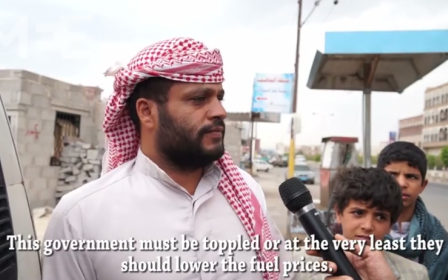Houthis launch Friday protests as violence hits north Yemen

Several Yemenis were killed in the restive northern province of al-Jawf on Friday, as a deadline set by rebels protesting in the capital Sanaa passed.
The rebels, made up of Shiite Houthi tribesmen and their supporters, have been camped out in Sanaa since Monday, calling for an end to recent cuts in fuel subsidies and, ultimately, the toppling of the current government.
They had set a deadline of Friday for their demands to be met, and staged a protest on the road leading to the international airport after Friday prayers.
Protesters surrounded the Electricity and Interior Ministries, chanting anti-government and anti-American slogans.
Sources from within the rebel movement had told Sky News that a preliminary ceasefire agreement had been reached.
However, in a speech later broadcast live, rebel leader Abdel Malek al-Houthi railed against what he called the government's "weak" stance on the US drones that have targeted sites in Yemen.
Houthi stressed that, though rebels have blockaded the capital, taking Sanaa is not their primary aim - "our aim is to bring down the government."
The US sent an “emergency message” to its nationals at the outset of the protests on Monday, urging them to leave the country and warning of “terrorist activities and civil unrest.”
Despite President Hadi’s order that the armed forces “raise their level of vigilance” on Thursday, commenters on the ground are so far reporting that the situation on the ground remains calm.
Houthis have dug into their positions in the capital, with more people arriving from provinces to Sanaa throughout the week.
The rebels have garnered support from some non-Houthi Yemenis who are frustrated at protracted efforts to stamp out corruption and implement political transition after anti-government protests in 2011.
However, there was also a pro-government rally in the southern city of Taiz on Thursday, which appeared to attract thousands of demonstrators.
Some progress seemed to have been made on the political front after efforts to reach an agreement between the government and the Houthi rebels on Thursday.
A high-level delegation from the government, including the deputy prime minister, flew to the Houthi stronghold in Saada province to discuss a ceasefire, which would include ten ministerial positions for Houthis.
In a speech on Thursday night after the talks, rebel leader Abdel Malik al-Houthi called on his supporters to maintain the peace, saying the government had "shown its understanding of some of our demands."
He said the movement will employ peaceful and legitimate means, warning President Hadi not to “fall into the trap of attacking people and protestors.”
However, violence in al-Jawf province north-east of the capital has intensified - an armed tribal fighter and a number of Houthi rebel fighters were killed during a clash in the province, as the Yemeni army backed by tribesmen attempted to rout the Houthis.
A Yemeni army soldier and a tribesman were also killed, along with an unidentified number of Houthi rebels, in clashes on Thursday.
The deaths came on the same day as Ansar al-Sharia in Yemen claimed to have killed up to 30 Houthis in two separate operations in al-Jawf.
Five Houthis and two tribesmen died in clashes in al-Jawf on Wednesday.
Houthi rebels strongly oppose the government's plans for a six-region federation, demanding a single region for the northern highlands and a greater share of power in the federal government.
They control Saada province in the far north and parts of several neighbouring provinces.
The rebels have been fighting an on-off conflict with government troops in the northern mountains for the past decade.
They are a minority in mainly Sunni Yemen but the majority in the northern highlands, including the Sanaa region.
Stay informed with MEE's newsletters
Sign up to get the latest alerts, insights and analysis, starting with Turkey Unpacked
Middle East Eye delivers independent and unrivalled coverage and analysis of the Middle East, North Africa and beyond. To learn more about republishing this content and the associated fees, please fill out this form. More about MEE can be found here.




